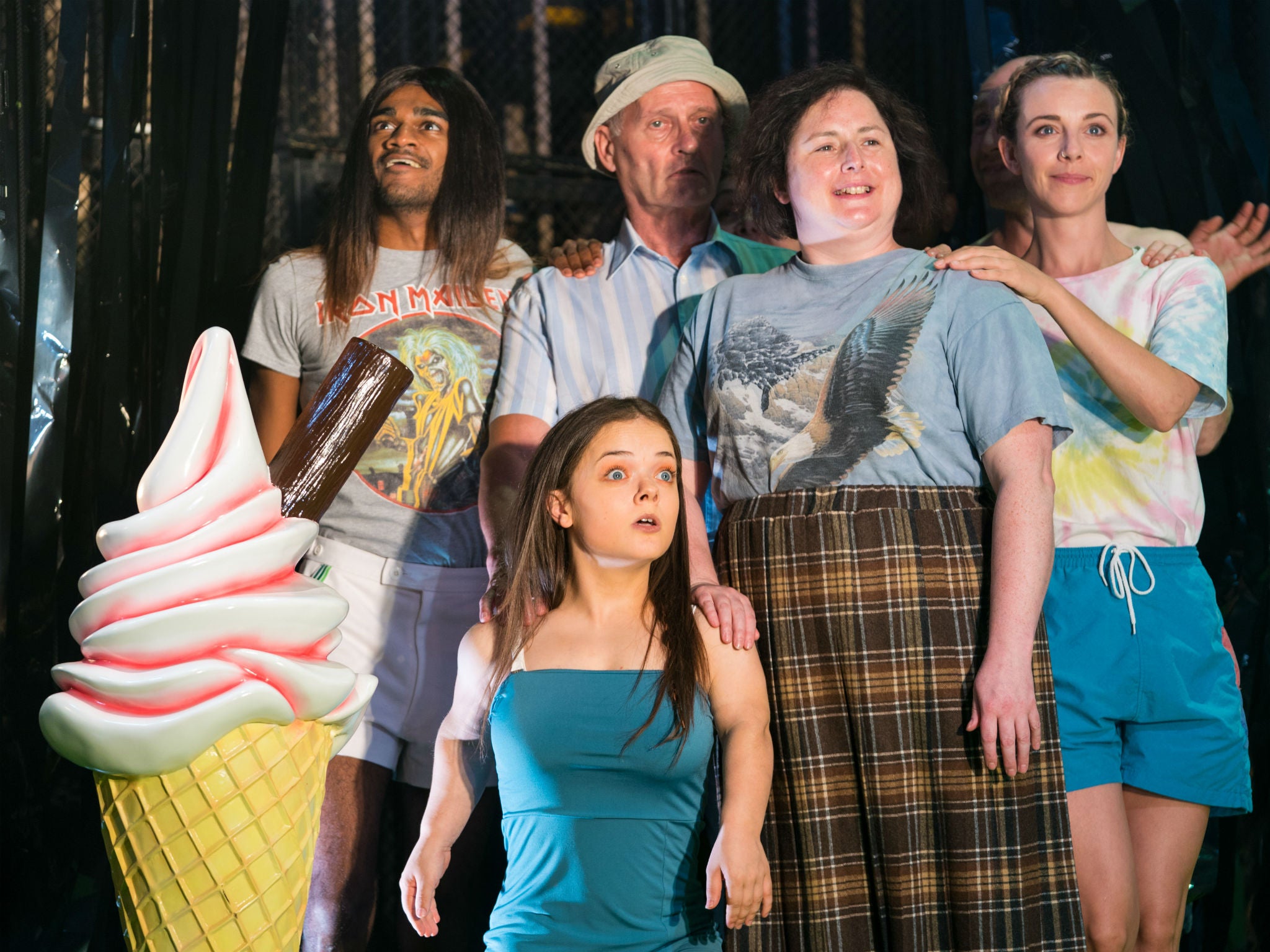Pity, Royal Court, London, review: Wearisome whimsy and wackiness
Rory Mullarkey's absurdist cartoon about a society that topples into apocalyptic anarchy is not well served by Sam Pritchard's relentlessly jokey production

Your support helps us to tell the story
From reproductive rights to climate change to Big Tech, The Independent is on the ground when the story is developing. Whether it's investigating the financials of Elon Musk's pro-Trump PAC or producing our latest documentary, 'The A Word', which shines a light on the American women fighting for reproductive rights, we know how important it is to parse out the facts from the messaging.
At such a critical moment in US history, we need reporters on the ground. Your donation allows us to keep sending journalists to speak to both sides of the story.
The Independent is trusted by Americans across the entire political spectrum. And unlike many other quality news outlets, we choose not to lock Americans out of our reporting and analysis with paywalls. We believe quality journalism should be available to everyone, paid for by those who can afford it.
Your support makes all the difference.“Oh, my dear! The noise! And the people!”: Ernest Thesiger’s famous remark about the Great War springs somewhat heretically to mind while watching Rory Mullarkey’s absurdist cartoon about a society that topples into apocalyptic anarchy in almost nothing flat.
The idea seems to be to tip onto the Royal Court stage – in revved-up surreal profusion – the kind of horrors that we might calmly countenance when scrolling in removed privilege through the blood-soaked mayhem accessible on our smart phones. It’s a bold conception and I wish I could say that it pans out in practice as well as it works on paper.
But it’s not best served by Sam Pritchard’s production, which trades in relentless jokey excess and, by that token, never – at least in my view – adequately pierces the cling film of our British insulation.
The proceedings begin in a toyland version of a perfect summer fete. We enter the theatre through the back of the building and cross a stage that has been carpeted as bright green sward, in Chloe Lamford’s inventive design. There’s a tombola and an ice-cream vendor; a crumpled sheet of canvas sky registers the platonic blue-with-fluffy-curds ideal of a balmy day; members of the Fulham Brass Band churn out cheery classics such as “Those Magnificent Men in their Flying Machines”.
Nothing untoward could happen in this spot, could it? Well, idylls don’t usually come fringed (as here) with hazard tape.
A young man – designated simply as Person and attractively played by Abraham Popoola – narrates his day and couples up at record speed with Daughter (Sophia Di Martino), with whom he negotiates an escalating succession of disasters. These begin when her Professor father, having drawn breath merely to vent a few chauvinist prejudices, is struck dead by lightning. Then the town’s department store is bombed and the nation is put on high terror alert.
There are random explosions; civil war breaks out; refugees roam the countryside; opposing war lords trundle around in their respectively blue and red tanks. Flooding and a fatal pandemic finish off those who have escaped death in the conflict. There’s a dubiously happy ending for the sole survivor.
Mullarkey is a gifted writer, and there are one or two brilliant passages in this. A crazed warlord (an excellent Sandy Grierson) castigates western capitalists in a berserk Scots-accented aria that imagines them “eating a steady stream of avocados in their skyscrapers... And playing petanque”. His resentment at the privileged is packed into the word “petanque”, which runs like an obsessive refrain through this speech, and is all the funnier because he has no idea what petanque actually is. So it’s all the more galling that the production as a whole is a chore to sit through.
The cast have adopted an ingratiating, and grating, ‘aren’t we being wacky?’ manner towards the audience. As though the law of diminishing returns is a concept yet to reach this neck of the woods, they seem to be under the delusion that more always means more.
A doctor, inspecting folk with no medicines to offer, rows round the infectious waters in – guess what? – a coffin. Offering a novel angle on repetitive strain injury, rival militias take turns in gunning each other down and claiming victory in numbingly rapid alternation, while techno dancing under a neon sign helpfully marked “Atrocities”. I wish I had a fiver for every time a character, tipping the wink that they are above being serious, stalks through the plastic side curtains to the strains of the “Dead March”. It wedges you deeper into the distanced condition from which the piece ought to be liberating you.
We’re treated to an appearance from the rattled, incoherent PM who sings a song about how how she can’t make her mind up about which sandwich to choose. But apart from that, we get a very hazy picture of how all this links up to the suffering being endured now in the real world. I know people who have lived, with great courage, in actual war zones. I’m grateful for the fact I didn’t have to ‘process’ this wearisome whimsy in their company.
Until 11 August (royalcourtheatre.com)
Join our commenting forum
Join thought-provoking conversations, follow other Independent readers and see their replies
Comments